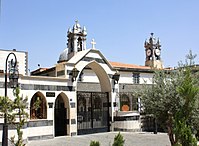Greek-Melkite Church
|
Melkite Greek Catholic Church |
|
|---|---|
| Arabic: كنيسة الروم الملكيين الكاثوليك | |

|
|
| Classification | Eastern Catholic |
| Orientation | Melkite |
| Polity | Episcopal |
| Primate | Patriarch Youssef Absi |
| Region | Egypt, Israel, Palestine, Jordan, Lebanon, Sudan, Syria, Argentina, Australia, New Zealand, Brazil, Canada, France, Mexico, United States, Venezuela and Sweden |
| Language | Arabic, Greek Diaspora: English, Portuguese, Spanish |
| Liturgy | Byzantine Rite |
| Headquarters | Cathedral of the Dormition of Our Lady, Damascus, Syria |
| Founder | Apostles Peter and Paul, by Melkite tradition |
| Origin | 1724 |
| Members | 1,522,802 |
| Official website | Melkite Greek Catholic Patriarchate of Antioch, Alexandria and Jerusalem |
The Melkite (Greek) Catholic Church (Arabic: كنيسة الروم الملكيين الكاثوليك, Kanīsat ar-Rūm al-Malakiyyīn al-Kāṯūlīk) is an Eastern Catholic Church in full communion with the Holy See as part of the worldwide Catholic Church. The Melkites, Byzantine Rite Catholics of mixed Eastern Mediterranean (Levantine) and Greek origin, trace their history to the early Christians of Antioch, formerly part of Syria and now in Turkey, of the 1st century AD, where Christianity was introduced by Saint Peter. It is headed by His Beatitude Patriarch Youssef Absi, MSP.
The Melkite Church has a high degree of ethnic homogeneity, and the church's origins lie in the Near East, centered especially in Syria and Palestine. Melkite Greek Catholics are present, however, throughout the world due to migration. Outside of the Near East, the Melkite Church has also grown through intermarriage with, and the conversion of, people of various ethnic heritages as well as transritualism. At present there is a worldwide membership of approximately 1.6 million. While the Melkite Catholic Church's Byzantine roots and liturgical practices are rooted in those of Eastern Orthodoxy, nonetheless the Church has maintained communion with the Catholic Church in Rome especially after its reaffirmation of its union with Rome in 1724.
Melkite, from the Syriac word malkā for "King" and the Arabic word Malakī (Arabic: ملكي, meaning "royal", and by extension, "imperial"), was originally a pejorative term for Middle Eastern Christians who accepted the authority of the Council of Chalcedon (451) and the Byzantine Emperor, a term applied to them by non-Chalcedonians. Of the Chalcedonian churches, Greek Catholics continue to use the term, while Eastern Orthodox do not.
...
Wikipedia
